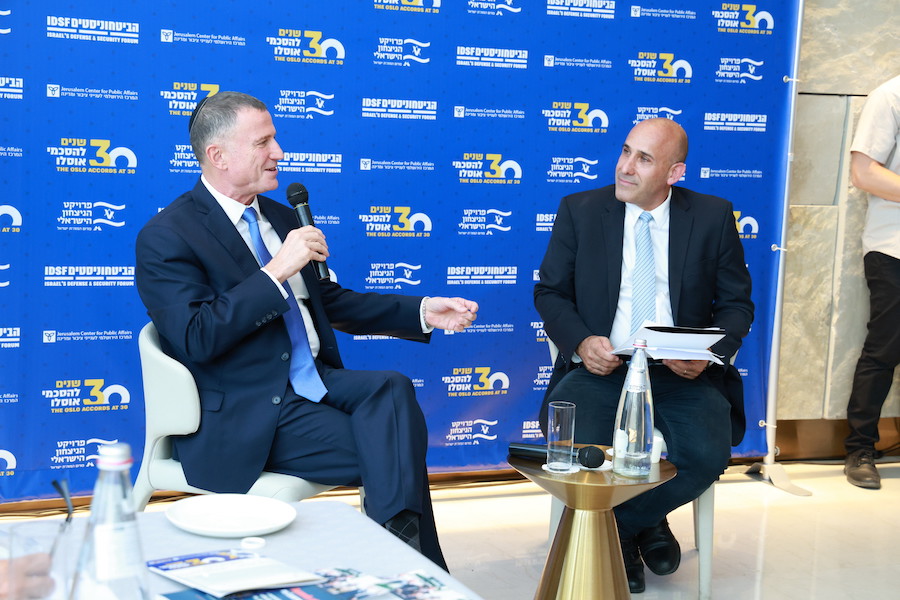30 years after the Oslo accords, Israelis lament catastrophic implementation of good idea

In a spacious Jerusalem hotel, dozens of Israelis convened to take stock of one of the most influential diplomatic agreements since the founding of the State of Israel, the Oslo Accords.
The fruit of a joint effort of the Israel Defense and Security Forum (IDSF) and the Jerusalem Center for Public Affairs and the Israel Victory Project, the day was devoted to understanding how the Oslo Accords were shaped, why the implementation eventually failed and how Israel should prepare itself for the imminent and foreseeable future.
In various panels, leading experts on security, diplomacy, Arab affairs, media and international law discussed the few benefits and many shortfalls of the Oslo Accords, and even provided advice on how Israel should be prepared to leverage upcoming events related to the Palestinians in pursuit of its own national security goals.
In his opening remarks, Brig.-Gen. (res.) Amir Avivi reflected on his personal disappointment with the implementation of the accords, and how astonished he was as a young battalion commander to see that despite the fact that the first phase of the accords, usually referred to as the “Gaza and Jericho First” stage, failed miserably, the Israeli establishment disregarded reality on the ground and proceeded to hand over security control of large parts of Judea and Samaria to Palestine Liberation Organization (PLO) thugs.
He said: “The fact that Israel attempted to negotiate peace with a group of terrorists in hiding in Tunis, instead of reaching out to the authentic and historic local leadership of the Palestinians in the cities and towns of Judea and Samaria was perhaps the gravest mistake of them all. Israel effectively rescued the PLO from oblivion and created the strategic problem that it is facing today in the form of Israel-hatred and BDS.”
As a factual foundation for the day’s panels and discussion, the IDSF research department distributed comprehensive and exclusive research on the topic by many of its military professionals, shedding light on underreported topics and statistics.
For example, a comparative analysis of Israeli civilian terror victims before and after the Oslo Accords shows that Israeli civilians were killed or wounded nine times more during the years after the implementation of the Oslo Accords (1994 to 2022) compared with all the years from Israel’s founding (1948 to 1993).
Polling of representative segments of Israeli society also highlighted how disillusioned Israelis are with the Palestinian Authority (PA) and how distant the vision of peace between the two peoples has become, as a result of the failed implementation of the Oslo Accords.
Among the guest speakers was the chairman of the Knesset Foreign Affairs and Security Committee, Knesset Member Yuli Edelstein, who was interviewed by the Founder of the IDSF, Brig.-Gen. (Res.) Amir Avivi.
Edelstein reflected on his own personal account as a new immigrant to Israel at the onset of the Second Intifada in 1987, and how his personal security deteriorated almost instantly. He was against Oslo and the unilateral Disengagement from Gaza, and stated that both these dramatic moves were based on a flawed understanding of reality and of the organizations Israel was dealing with.

In a reference to current affairs, Edelstein cautioned that Israel must stand firm against foreign attempts to condition any expansion of the Abraham Accords on concessions to the Palestinian Authority, even if “the demands were made by friends”.
In the closing session of the day, former U.S. Ambassador to Israel David Friedman reflected on the amateurish implementation of the Oslo Accords, whom he and many others at first “thought were just a joke,” and how surprised he was to see the entire Israeli establishment support.
In stark contrast, the Abraham Accords, which Ambassador Friedman was part of designing and implementing, provided tangible positive results on the ground in the Middle East, without bloodshed or terror.
The IDSF and JCPA intend to brief the Israeli government, security organizations, think-tanks, academia and foreign officials and institutions on the lessons that should be implemented after 30 years of the Oslo Accords.

Lt. Col. (res.) Jonathan Conricus served as the IDF International Spokesperson. He currently serves on the advisory board of the Israel Defense And Security Forum.














